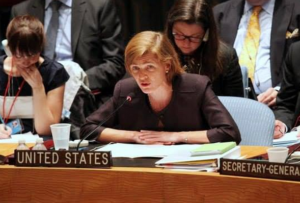Special to WorldTribune.com
Radio Free Europe / Radio Liberty
Russia has joined several dozen Islamic countries in barring 22 LGBT-rights groups from participating in a major United Nations meeting on HIV/AIDS next month.
The move to exclude the lesbian, gay, bisexual, and transgender (LGBT) defenders has drawn sharp criticism from UN officials, Western diplomats, and activist groups around the world.
Although UN rules prevent the public release of the list of countries insisting the groups be excluded, The New York Times and other media report seeing it and that it includes Russia, Cameroon, Tanzania, and the 57-member Organization of Islamic Cooperation (OIC).

The countries did not have to give any reasoning for their request to bar the groups.
The Joint United Nations Program on HIV/AIDS (UNAIDS) issued a statement on May 18 saying that “it is crucial that the voices and perspectives of individuals and organizations be heard…including the voices of people living with HIV and people most affected by the epidemic.”
“The doors of the United Nations should be open to all,” the statement said.
The UN General Assembly High-Level Meeting on Ending AIDS will be held in New York on June 8-10. It is intended to develop an international strategy for achieving the UN’s HIV/AIDS targets for 2020.
Pangaea Global AIDS, an international umbrella organization of HIV/AIDS organizations, issued an open letter to UN Secretary-General Ban Ki-moon saying that the exclusion of the groups was “unacceptable.”
The letter urged the General Assembly to “show moral and political leadership” by overturning the exclusions.
According to The New York Times report, the objecting nations originally sought to ban 39 groups, but intense lobbying by UN General Assembly head Mogens Lykketoft reduced that number to 22.
The United States’ envoy to the UN, Samantha Power, criticized the exclusions in a letter to Lykketoft, saying, “Given that transgender people are 49 times more likely to be living with HIV than the general population, their exclusion from the high-level meeting will only impede global progress in combating the HIV/AIDS pandemic.”
The website Vice News reported that two Russia-based groups are included on the banned list, but did not name them. Other media reports named the Moscow-based NGO Esvero, an anti-AIDS group that focuses on preventing the spread of the illness among intravenous drug users.
“I don’t have any information that anyone has undertaken to exclude us from the High-Level Meeting,” Esvero Director Pavel Aksyonov told RFE/RL on May 19.
Aksyonov added, however, that the Russian government opposes Esvero’s activities among drug users. The organization is no longer allowed to operate its needle-exchange programs, he said.
The Russian government opposes all forms of “harm reduction,” which is a strategy of “nonjudgmental, non-coercive” provision of services to reduce ill effects of drug use, including HIV infection. Typical harm-reduction programs include opioid-substitution therapy and needle exchanges. http://www.harm-reduction.org/issues/opiate-substitution-therapy
Aksyonov said Esvero supports the rights of lesbians, gays, bisexual, and transgender people, but it does not actively work in this area.
The Russian government has not commented on the controversy.
Russian authorities reported in January that the number of registered HIV infections in the country had reached 1 million, including 93,000 new cases registered in 2015. Since 1987, more than 200,000 people have died of AIDS in Russia, according to official figures.
Another group that has been excluded, according to a statement on its website, is the Estonia-based Eurasian Coalition on Male Health (ECOM), an umbrella organization working across Eastern Europe and Central Asia that provides “treatment, care, and support for men who have sexual relations with other men and transgender people.”
Many other groups reportedly excluded focus on providing services to the LGBT community. Tanzania and Cameroon reportedly sought the exclusion of nine local NGOs, including a Cameroonian organization called Affirmative Action that provides “refuge for LGBT victims of violence.”
The UN says 560 nongovernmental groups from around the world have been accredited to attend the High-Level Meeting. The New York Times reported that 16 of the 22 banned groups will send representatives as part of the delegations of other groups.
In 2014, Russia joined a similar coalition of countries — 43 in all — in unsuccessfully opposing Ban’s order that the UN recognize same-sex marriages among its staff.
In February, the 25-member Group of Friends of the Family, which is led by Belarus, Egypt, and Qatar, joined the Organization of Islamic Cooperation and the Africa Group in protesting the issuance of six UN stamps promoting tolerance and LGBT equality.
